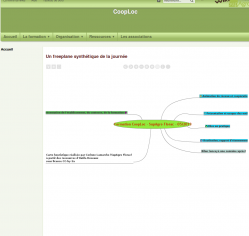
A change in posture for associations: embracing cooperation
Card's author :
Corinne Lamarche et Claire Herrgott - SupAgro Florac
Card's type of licence :
Creative Commons BY-SA
Testimonies :
Setting up a one-day training course on network facilitation for local associations.
At the Moustic Meeting, we signed up for a workshop on the Project accelerator method. After forty-five minutes at last we had found the answers to our questions: "Conceiving a 6-hour training tool for 15 people with three objectives: living an irreversible cooperation experience, discovering collaborative tools and formulating a change in posture to facilitate participation of a network or association's members".
Thanks to this method, around ten people cleared the way and opened action tips to us.
Pooling resources on the platform CoopTic during our own training allowed us to recover some parts of the course, (especially the course by Jean-Michel Cornu on Cooperation in 28 keywords)
Using these tools allowed us to reduce the number of meetings, and we were able to work on on-line documents, at a distance, between several people (to improve their contents) and to get the trainees involved in the training right from the start, as well as along the way.
Why CoopLoc ?
After the training course CoopTic, we were asked to explain to some fifteen facilitators what we had learnt, in what was called a "scaling-down phase". Inhabitants from Lozère, with a dense associative fabric, wanted us to share our experiences with the local associations. We often heard: we always find the same people attending the different associations, people don't participate,…so, how can we encourage participation? How can we provide paid people or volunteers with a tool to optimise the way they facilitate these association networks?Formalising the project
At first we were wondering what the duration of the training should be, the number of participants, the content of the course: we wanted to deal with so many things we had heard and experiences in Cooptic.At the Moustic Meeting, we signed up for a workshop on the Project accelerator method. After forty-five minutes at last we had found the answers to our questions: "Conceiving a 6-hour training tool for 15 people with three objectives: living an irreversible cooperation experience, discovering collaborative tools and formulating a change in posture to facilitate participation of a network or association's members".
Thanks to this method, around ten people cleared the way and opened action tips to us.
What tools for organisation tasks ?
The tools used depended on the tasks to be done:- a wiki: where we created a section called Organisation (pedagogical plan, questionnaire), a section on Training (a page for participants where everyone could introduce themselves, a page for the day's tempo, a picnic page to organise a collaborative picnic) a section on Resources (links to networks and facilitator training resources, sites, articles, tools and a bibliography)
- a file shared on Google Drive: a form for the registration of participants, for the report sent one week later; a text file to write an email between two people to then send it to the participants; a text file to write the press review article after the training course where all participants could contribute;
- a Pad: for collaborative writing during the day of training;
- a freeplane: one for a summarised introduction to the session, with Internet links; and another one that was completed on-site, at the end of the session, to explain the remarks made by the trainees;
- a Doodle: to organise a picnic, which was sent to each participant to foster a bit of sharing
- a Dropbox: to save final documents (the final email on pdf, the freeplane, the attendance sheet, the chart for the barcamp).
Pooling resources on the platform CoopTic during our own training allowed us to recover some parts of the course, (especially the course by Jean-Michel Cornu on Cooperation in 28 keywords)
Using these tools allowed us to reduce the number of meetings, and we were able to work on on-line documents, at a distance, between several people (to improve their contents) and to get the trainees involved in the training right from the start, as well as along the way.
Internet link :
http://wikis.cdrflorac.fr/w/CoopLoc/wakka.php?wiki=Accueil
